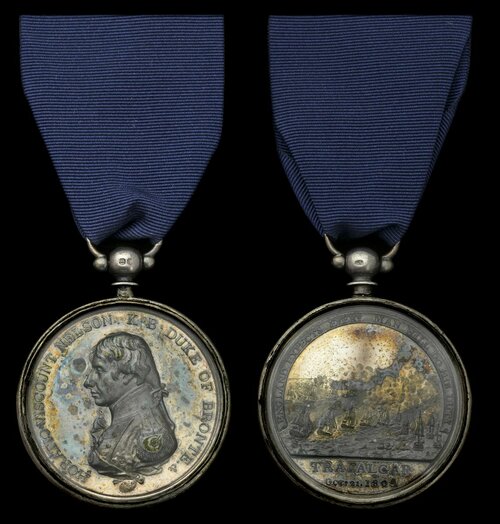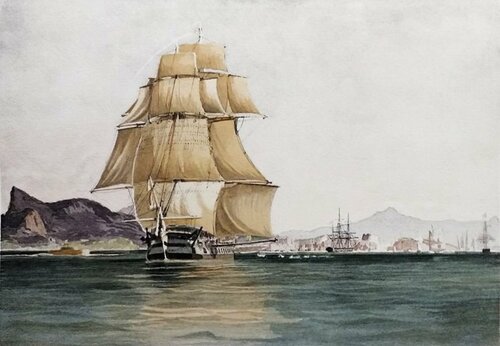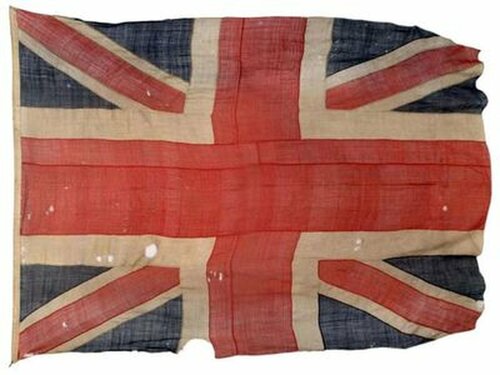Auction: 21002 - Orders, Decorations and Medals
Lot: 1
The superb Boulton's Trafalgar Medal awarded to Rear-Admiral J. McKerlie, Royal Navy who, despite the loss of an arm early in his career, served with distinction at Trafalgar as First Lieutenant aboard H.M.S. Spartiate, went on to see action in the ill-fated Walcheren Expedition, and subsequently took command of the experimental frigate H.M.S. Vernon
Matthew Boulton's Medal for Trafalgar, silver (John M'Kerlie 1st Lieut.) mounted in an attractive, hallmarked silver frame with glazed lunettes, naming contemporarily engraved around edge, lunettes slightly chipped, Medal extremely fine
John McKerlie was born on 7 June 1774 at Glenluce, Wigtonshire, the son of John McKerlie, a stonemason. He enlisted in the Royal Navy on 23 April 1794 from the Merchant Navy, as a Volunteer rated Able aboard the 38-gun HMS Arethusa, at that time commanded by the renowned frigate captain Sir Edward Pellew. The extraordinary exploits of a later command, HMS Indefatigable were to be fictionalised in C.S. Forester's Hornblower novels; many of the young officers who served with Pellew aboard this vessel went on to have astonishing careers - more than one has been described as being the inspiration for our eponymous hero Horatio Hornblower and it is not beyond the realms of possibility to consider McKerlie's service providing some of that inspiration.
He must have made an impression on Pellew, following him to his next command - the 44-gun razee frigate HMS Indefatigable in December 1794 with the rating of quarter-gunner, a swift rise from his original rank in a short space of time. McKerlie's progressive career aboard the Indefatigable is testament to his abilities both as a seaman and his intelligence, since he served for a short period as the ship's Schoolmaster.
Pellew's tenure as Captain was highly successful with the most notable engagement being the Action of 13 January 1797. After the failed French invasion of Ireland the Indefatigable, accompanied by the 36-gun HMS Amazon, were ordered to harass the stragglers of the French fleet in December 1796. They chanced upon the 74-gun French Ship-of-the-Line Droits de l'Homme, transporting a demi-regiment of artillery, overloaded and struggling in rough seas. Unable to open her lower-deck gun ports due to the stormy weather (thereby negating her distinct advantage in firepower), and having already suffered damage from the elements, the Droits de l'Homme was in poor shape for a fight. Captain De Lacrosse, well aware of his unenviable situation, chose discretion over valour and attempted to escape. Over the course a ten-hour pursuit the Indefatigable and Amazon used their superior manoeuvrability to repeatedly rake their foe across stem and stern, causing severe damage aloft and even cutting away her mizzenmast. The Droits de l'Homme returned fire as she could, but ran so low on ammunition during the engagement that her crew resorted to using the artillery shells they were transporting for use in Ireland. The battle only ended at 04:20 when lookouts spotted land, less than two miles distant. The British broke off immediately - however Amazon ran aground, on what turned out to be the coast of Brittany, and her crew were captured. The Droits de l'Homme with sails and rigging severely damaged from the running fight, could no longer manoeuvre effectively and consequently ran aground on a sandbank. Trapped in place, the vessel was destroyed by the rough seas and of the 1,350 soldiers and seamen aboard only 400 were able to escape. The action was regarded as a triumph: Pellew had succeeded in using his advantages of speed and manoeuvrability to cripple and cause to be destroyed his far larger and stronger opponent. McKerlie however was in no state to celebrate their victory, having lost his right arm in the fighting as well as suffering a wound to the thigh. Fortunately he survived his wounds, continuing to serve under Pellew despite his handicap.
McKerlie again followed Pellew when in 1799 he captained the 74-gun HMS Impétueux, doubtless witnessing the attempted mutiny launched by some of the crew in May of that year. However, the mutineers were supressed by the ship's Marines, who had remained loyal to the Captain; three men were hanged and another six flogged in response to the uprising.
The next year the Impétueux took part in the attack on Brittany at Quiberon which was intended to support a Royalist uprising. The naval squadron landed troops, including their own contingents, destroying coastal forts and taking several ships; during the course of these engagements McKerlie himself participated in several small actions with the ships' boats. He appears to have had a close relationship with Pellew who significantly aided his career. Indeed during the planning of the aborted Belleisle operation, a part of the larger Quiberon expedition, he even appointed him a Temporary Lieutenant commanding the 32-gun frigate HMS Thames. Unfortunately the attack was abandoned when it became clear that the Royalist uprising had failed. An amusing incident recounted in the Royal Naval Biography (J. Marshall) relates that McKerlie:
'…went up to Sir Edward, interrupted him in a conversation with Major-General Maitland, and asking what part he was to act in the event of a debarkation taking place? The answer was: "McKerlie you have lost one hand already, and if you lose the other you will not have anything to wipe your backside with; you will remain on board with the first lieutenant and fight the ship as she is to engage an 8-gun battery".'
Promoted Lieutenant in October 1800, McKerlie was fortunate to continue serving in that rank throughout the peace which followed the Treaty of Ameins - first in the Channel Fleet and later as part of the Newfoundland Station. However with the recommencement of hostilities in May 1803 he returned to the fold, being appointed to the 74-gun HMS Spartiate as First Lieutenant on 13 March 1804; it was with that ship that he participated in the Battle of Trafalgar a year later, on 21 October 1805. During the course of the battle the Spartiate was the final ship in Admiral Lord Nelson's own weather column. The Spartiate first engaged the 80-gun Formidable and later joined HMS Minotaur in trapping and pummeling the 80-gun Spanish ship Neptuno. By this point it was already late in the day and the Neptuno had suffered damage, whilst the Spartiate and Minotaur were still fresh. Nevertheless the Spanish ship put up a tough fight, being the last vessel of the Franco-Spanish fleet to surrender. The Spartiate suffered very lightly compared to many, with only three crewmen dead and 20 wounded. The Spartiate's captain, Francis Laforey, logged the damage to the ship as:
'The Foremast and Bowsprit badly wounded in two places. 1 shot well thro' the heel of Maintopmast, which splintered it much. Fore & Main Shrouds shot away and several of the Top mast Do. Backstays running rigging all cut very much and several shots in our hull & several small grape shot in the Fore and Main masts Empd Repg the damages & getting the Ship ready to renew Action'
Laforey himself was an interesting figure, a contemporary of Nelson with a stellar career already secured; he was the flag-bearer behind Nelson's coffin during his funeral and was later appointed Commander-in-Chief of the Leeward Islands and promoted Admiral in addition to being made a Knight Commander of the Bath in 1814.
Before progressing with McKerlie's career it is worth noting that Spartiate's Union Jack was rediscovered, in excellent condition, in 2009 by the family of Lieutenant James Clephan, to whom it had been presented upon his promotion at the conclusion of the battle: it sold at Charles Miller Ltd., on Trafalgar Day, for £384,000.
Following the battle McKerlie was promoted Commander (24 December 1805): however, he was then seconded from the Navy to work as a surveyor with the famed civil engineer Thomas Telford ('the Colossus of Roads'), being employed in this role from 1806-1808. His work with Telford focused upon a survey of roads and bridges: Telford had requested the aid of a naval officer and, given his father's work as a stonemason, McKerlie must have been the perfect choice.
Upon returning to naval service after his civilian hiatus he was given command the 10-gun Brig Calliope (1808); a year later he took part in the ultimately unsuccessful expedition to Walcheren, nevertheless personally distinguishing himself in the command of a number of gun brigs on the Scheldt. He built upon this success when appointed to hunt privateers off North Holland - notably taking the 14-gun Comtesse d'Hambourg on 25 October 1810.
Appointed to the command of a Squadron based in North Heligoland (in the process of which he oversaw the defence and eventual retreat from Cuxhaven), upon his replacement at Heligoland in October 1813 McKerlie was directed to launch a raid up the river Weser and seize two 20-gun corvettes there. This was achieved and McKerlie returned to Britain aboard those corvettes in December 1813. Promoted Post Captain on 4 December 1813, he was unfortunately unable to find another command and returned to his native Galloway. Here he married Harriet Stewart, second daughter of James Stewart of Cairnsmuir, with whom he had one daughter.
In keeping with his naval career and love of the sea, McKerlie became the owner and Captain of the merchant ship Garlies as well as serving as a magistrate for Wigtonshire; in 1816 he was the recipient of a pension for the loss of his arm. Despite this apparent success in a comfortable civilian life McKerlie was to return to the Royal Navy some twenty years after he left it when, in 1834, he was appointed captain of the experimental frigate HMS Vernon, a revolutionary vessel whose unique design made her far faster and more stable than similar ships of that class; her figurehead can be seen to this day at No. 1 Gunwharf Quay, Portsmouth.
Promoted Rear Admiral on 1 October 1846, with the creation of the Naval General Service Medal in 1847 McKerlie found himself one of only eight surviving veterans entitled to the Indefatigable 13 Jan 1797 clasp; he is further entitled to the Indefatigable 20 April 1796 and Trafalgar clasps - a unique combination. He died at Corvisel House, Newton Abbott in 1848.
McKerlie is certainly not as well known today as he deserves to be: his exploits saw him rise from Volunteer to Rear Admiral, earning accolades and promotions from great men such as Pellew and Laforey along the way. All the more impressive when one remembers that he did most of it single-handedly.
The National Maritime Museum, Greenwich, holds several examples with lunettes of very similar form to this example, one of which is on public display in the 'Nelson, Navy, Nation' Gallery. The flag flown from the jackstaff of Spartiate at the Battle of Trafalgar sold for £394,000 in 2009, now being held in the Zaricor Flag Collection.
Subject to 20% VAT on Buyer’s Premium. For more information please view Terms and Conditions for Buyers.
Sold for
£12,000
Starting price
£1400









